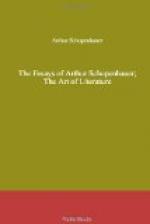If the reader wishes to study any subject, let him beware of rushing to the newest books upon it, and confining his attention to them alone, under the notion that science is always advancing, and that the old books have been drawn upon in the writing of the new. They have been drawn upon, it is true; but how? The writer of the new book often does not understand the old books thoroughly, and yet he is unwilling to take their exact words; so he bungles them, and says in his own bad way that which has been said very much better and more clearly by the old writers, who wrote from their own lively knowledge of the subject. The new writer frequently omits the best things they say, their most striking illustrations, their happiest remarks; because he does not see their value or feel how pregnant they are. The only thing that appeals to him is what is shallow and insipid.
It often happens that an old and excellent book is ousted by new and bad ones, which, written for money, appear with an air of great pretension and much puffing on the part of friends. In science a man tries to make his mark by bringing out something fresh. This often means nothing more than that he attacks some received theory which is quite correct, in order to make room for his own false notions. Sometimes the effort is successful for a time; and then a return is made to the old and true theory. These innovators are serious about nothing but their own precious self: it is this that they want to put forward, and the quick way of doing so, as they think, is to start a paradox. Their sterile heads take naturally to the path of negation; so they begin to deny truths that have long been admitted—the vital power, for example, the sympathetic nervous system, generatio equivoca, Bichat’s distinction between the working of the passions and the working of intelligence; or else they want us to return to crass atomism, and the like. Hence it frequently happens that the course of science is retrogressive.
To this class of writers belong those translators who not only translate their author but also correct and revise him; a proceeding which always seems to me impertinent. To such writers I say: Write books yourself which are worth translating, and leave other people’s works as they are!
The reader should study, if he can, the real authors, the men who have founded and discovered things; or, at any rate, those who are recognized as the great masters in every branch of knowledge. Let him buy second-hand books rather than read their contents in new ones. To be sure, it is easy to add to any new discovery—inventis aliquid addere facile est; and, therefore, the student, after well mastering the rudiments of his subject, will have to make himself acquainted with the more recent additions to the knowledge of it. And, in general, the following rule may be laid down here as elsewhere: if a thing is new, it is seldom good; because if it is good, it is only for a short time new.




